Between July 6th and July 14th, 2019, organized by the office of international affairs of Tsinghua SEM and led by associate professor ZHANG Jin of Department of Leadership and Organization Management, and assistant professor YIN Cheng of Accounting Department, 12 MBA students of 2019 CKJ program went to Korea Advanced Institute of Science and Technology (KAIST) and started a 9-day exchange study. The theme of this year’s program is “Enterprise Innovation”. With rich experience in their own industries and pursuit for dialectic thinking, the students started their China-Japan-Korea short-term study exchange program in Korea.
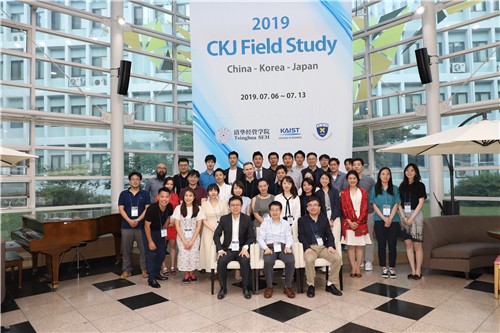
The welcome dinner of 2019 China-Japan-Korea Exchange Program at KAIST
The program officially started on July 8th. KAIST Business School, as the organizer, took teachers and students from Tsinghua SEM and Business School of Keio University in Japan to visit a number of companies within just 8 days, allowing us to experience the vigorous development of Korean innovation and entrepreneurship through communication and exchanges .
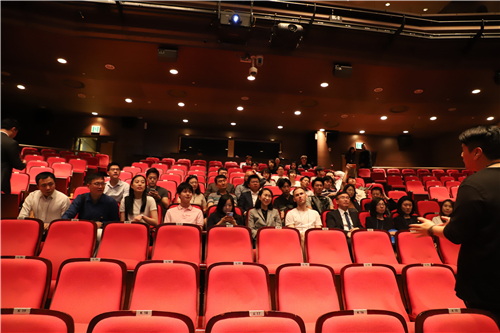
At SM Artium, the largest entertainment business company of Korea
The first type of independent incubator organization we have visited is the D-CAMP non-profit organization with outstanding achievements. As an incubator organization founded by fund donations from 18 banks, D-CAMP provides companies in the incubator with such services as office space, capital, personnel recruitment, corporate organization management and development, personnel training, and international exchange and cooperation .
The second type is business incubators, represented by SK telecom’s True Innovation Lab. SK telecom started to set up the True Innovation Lab externally in 2018, attracting projects from outside. Its incubating companies operate basically around the upstream and downstream of the company’s industrial chain, and most of their projects are about new technology development and application of research results.
The third type is incubators of universities. One focus of our visit is the incubator ecology of KAIST. In the system, KAIST Idea Factory participates in incubation project during the early phase, IR Studio helps enterprises promote themselves through means like IR video during the middle phase, and during the late phase K-School as the school of innovation and entrepreneurship provides relevant support.
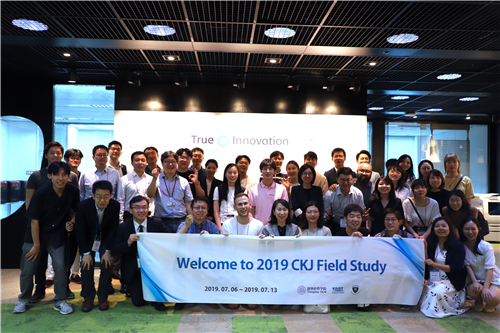
At SK True Innovation Lab
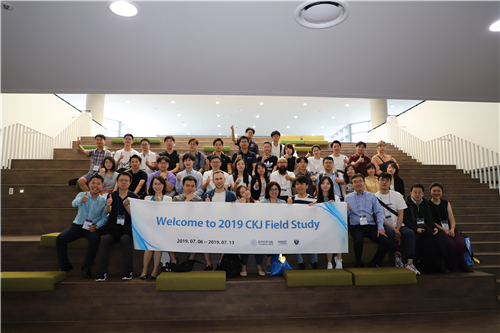
At KAIST K-School
An important part of the China-Japan-Korea short-term exchange program is the group-based enterprise research report. Each group consists of two students respectively from schools of China, Japan and Korea. Before the official start of the program, the Korean students were responsible for collecting relevant information and English briefings about the target company. After the program officially started, each group carried out in-depth study, research and interviews with their company with a list of discussed questions. In response to the questions of the target company, each group tried their best to think deeply about the company’s business model and make suggestions for its development. During the one-and-a-half-day report writing process, despite inevitable disputes due to students’ different cultural and growth backgrounds of the three countries of China, Japan and South Korea, students gave feedback that the experience was very valuable.

Product display on site at the researched enterprise
As for the business research session, students gave positive feedback that they gained a lot from it. “We have different views and perspectives, and this is precisely the most precious part we have learned from this program.” Compared with many other overseas programs, this is one of the few reports that require the participation of students from the three countries. Students thought about the business model and innovative development of the target company from perspectives of the social, economic and cultural backgrounds of the three countries as well as their own backgrounds, and a clash of of ideas always arose. With efforts made by students staying up late at night, with modifications made by students running back early in the morning, and with energy produced by drinking three cups of coffee continuously, each group perfectly presented the results of the group’s joint efforts finally.
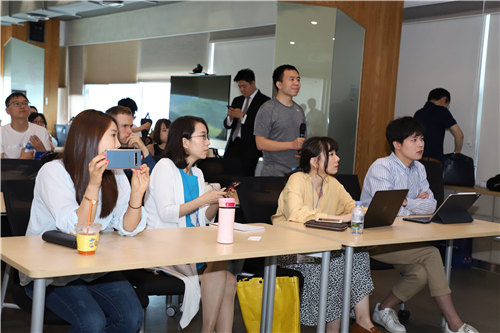
At the researched enterprise where a speech was delivered

Winner Team of 2019 CKJ program
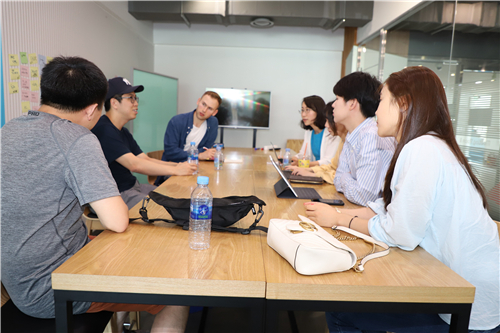
Runner-up Team of 2019 CKJ program
The people and the city
We once passed along the gurgling water of Cheonggyecheon and saw the bustling of the CITY HALL,
We once walked through the ups and downs of the campus and felt the tranquility of KAIST,
We once went to the towering SEOUL SKY and imagined the great changes that had happened to Seoul,
We crowded into the Korean hot pot restaurant and chatted about our past in the steam of seven or eight cauldrons,
We also walked several intersections looking for bubble tea and laughingly told each other after drinking up that the most tasty one is still in China,
At the farewell banquet on the last night, we, feeling slightly drunken, held back the urge to cry, hugged each other, and loudly shouted: CKJ, we love you.
After the courses finished, we all successfully became former CKJ participants. All of a sudden, we started to recommend tirelessly to our younger schoolmates: in 2020, if you encounter the opportunity of applying for CKJ, please don’t miss it, otherwise you would miss it for life. Farewell, CKJ!
About the program
Tsinghua MBA China-Japan-Korea short-term exchange program (CKJ program) originated from the “oath of brotherhood in the peach garden” sworn by three professors from Tsinghua University, Korea Academy of Science and Technology, and Keio University in Japan in 2004. As 15 years have passed, this accidental inspiration has been put into reality and become a far-reaching short-term exchange program of three business schools. The three schools take turns each year to host the program, including determination of the theme and companies to visit, as well as production of a corporate research report at the end of the course.
Written by: WU Ting of Class 16P1
Photos taken by: HUANG Chengqing of Class 17P3